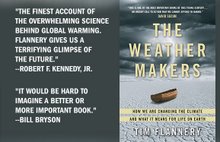PREAMBLE: In this
issue we report on the findings of a survey of federally employed scientists commissioned
by the Professional Institute of the Public Service of Canada.
By way of political background for the majority of our
readership, which is mostly (85%) international in distribution, it is now virtually
common knowledge in Canada that the evidence-based views of scientists have been
both generally and selectively suppressed by the ruling Conservative government of
Stephen Harper on a wide range of issues, such as: fisheries management, crime
prevention, food safety standards, public health, and environmental protection
among many others, not to overlook the barely concealed denial of climate change
and the need for Canada to step up and play a more constructive role in its
alleviation.
All this is not so surprising, given that the so-called “Conservative
Party“ is actually a cobbling of the Canadian Alliance Party (which had its
roots in the right wing fundamentalist former Reform Party of Canada), with the
once powerful Progressive Conservatives. The outcome ushered into federal
politics numerous political actors who did/do not comprehend the role of
science, favouring a biblical interpretation of issues bearing on the body
politic. As an example, this rose to a ridiculous
level in the appointments of Stockwell Day as (consecutively) Minister for Public
Safety, Minister of International Trade, then President of the Treasury Board, despite
having voiced the belief that dinosaurs and man walked the Earth simultaneously,
and who held that people with AIDS deserve no sympathy, among other retrograde
views. Although he dropped out of federal politics in 2011, he was not simply
an isolated case: an undercurrent of science denial still swirls disturbingly just
below the surface of the so-called Conservative Party.
Ironically, in light of early commitments to transparency,
the Harper government has also revealed itself to have suffered increasingly from
major corruption ranging from tampering with local elections (deliberately
misleading “robocalls”) to major expense fraud committed by several Senators
personally appointed by Prime Minister Harper himself.
To understand how this mess came about, it is important
to recognize that the ascendancy of the so called Conservative Party of Canada capitalized
on the fact that, while a majority of Canadians have never supported its ideology,
their political support is split between two other major parties: the New
Democratic Party (now official opposition) and the Liberal Party of Canada (former
government). And even though the Green Party accounts for ~7% of voter support,
lacking proportional representation, it enjoys only one representative in
parliament. Parenthetically, there is a
movement to address the need for proportional representation.
In this preamble, we have used the term “so-called”
advisedly, as we are aware that many mainstream conservatives do not align
themselves with the Conservative Party of Canada as they now see it under the Harper
regime, and that many are embarrassed by it and would like to restore a balance with proper respect for science
(especially in relation to the environment and public health) as well as more transparent
and accountable government. This sentiment includes streams of political
rationality and global values (as distinct from fundamentalism); but these face
an uphill battle.
With this thumbnail sketch of contemporary Canadian politics, written mostly for our international readers, we now present (verbatim), a release from the Professional Institute of the
Public Service of Canada. Readers wishing greater
detail, will also find below the URLs for linking to the full report, and the technical
report from Environs, the firm which conducted this survey under contract.
Release: PROFESSIONAL INSTITUTE OF THE PUBLIC SERVICE OF
CANADA
“Most
Federal Scientists Feel They Can’t Speak Out, Even If Public Health and Safety
at Risk, Says New Survey”
A
major survey of federal government scientists commissioned by the Professional
Institute of the Public Service of Canada (PIPSC), has found that 90% feel they
are not allowed to speak freely to the media about the work they do and that,
faced with (making) a departmental decision that could harm public health, safety or the
environment, nearly as many (86%) would face censure or retaliation for doing
so.
The
survey, the findings of which are included in a new report titled The Big
Chill, is the first extensive effort to gauge the scale and impact of
“muzzling” and political interference among federal scientists since the Harper
government introduced communications policies requiring them to seek approval
before being interviewed by journalists. Information Commissioner Suzanne
Legault is currently conducting her own investigation of the policies, which
have been widely criticized for silencing scientists, suppressing information
critical or contradictory of government policy, and delaying timely, vital
information to the media and public.
In
particular, the survey also found that nearly one-quarter (24%) of respondents
had been directly asked to exclude or alter information for non-scientific
reasons and that over one-third (37%) had been prevented in the past five years
from responding to questions from the public and media.
In
addition, the survey found that nearly three out of every four federal
scientists (74%) believe the sharing of scientific findings has become too
restricted in the past five years and that nearly the same number (71%) believe
political interference has compromised Canada’s ability to develop policy, law
and programs based on scientific evidence. According to the survey, nearly half
(48%) are aware of actual cases in which their department or agency suppressed
information, leading to incomplete, inaccurate, or misleading impressions by
the public, industry and/or other government officials.
“Federal
scientists are facing a climate of fear,” says PIPSC president Gary Corbett, “–
a chill brought on by government policies that serve no one’s interests, least
of all those of the Canadian public. The safety of our food, air, water, of
hundreds of consumer and industrial products, and our environment depends on
the ability of federal scientists to provide complete, unbiased, timely and
accurate information to Canadians. Current policies must change to ensure these
objectives are met.”
“Documenting
the problem is the essential first step toward solving it,” added Francesca
Grifo, Senior Scientist with the Union of Concerned Scientists in the United
States where, under the Bush administration, federal scientists faced many
similar problems. “You can’t hope to solve the issues until you fully
understand them.”
Invitations
to participate in the online survey, hosted by Environics Research, were sent
to 15,398 PIPSC members – scientists, researchers and engineers – engaged in
scientific work in over 40 federal departments and agencies. Of these, 4,069
(26%) responded between June 5 and 19, 2013. The survey is considered accurate
+ or – 1.6%, 19 times out of 20
Source: Statement
from the Professional Institute of the Public Service of Canada.
The
ENVIRONICS REPORT: http://www.pipsc.ca/portal/page/portal/website/issues/science/pdfs/environics.en.pdf
The
FULL REPORT IS AVAILABLE AT: http://www.pipsc.ca/portal/page/portal/website/issues/science/pdfs/bigchill.en.pdf




















